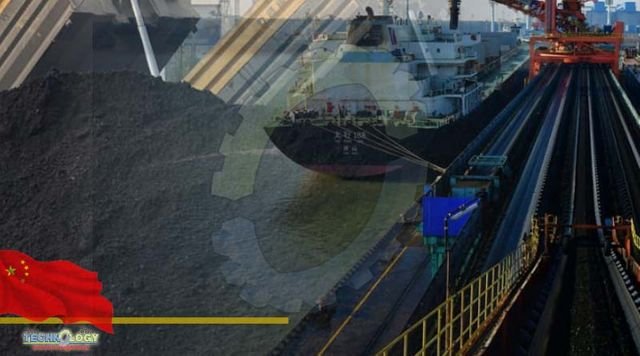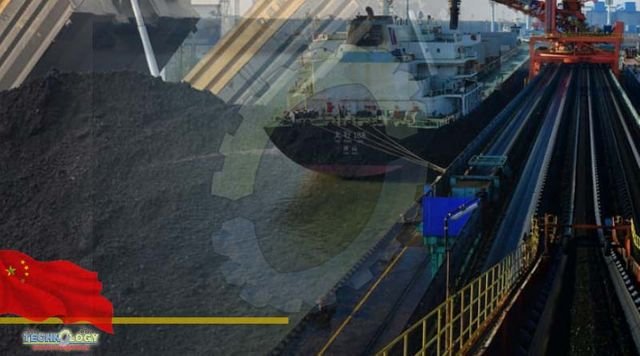China will scrap tariffs on coal imports the Ministry of Finance announced on Thursday, marking a rare move to ensure energy security amid growing uncertainties in global coal supply due to geopolitical volatility and other factors.

The move is aimed at enhancing the energy supply and promote high-quality economic development, the ministry said. Different types of coal products ranging from anthracite to coking coal, which is normally subject to tariff rates between 3 percent and 6 percent, will be excluded from duties during the stated period.
China has previously removed tariffs to support coal imports, but has not done so for over a decade. The last time China scraped coal tariffs was in 2008, when the global economy was mired in a financial crisis started in the US. The import duties were reinstated in 2014. The scrapping of duties typically is permitted by the government in the face of tightening supply.
During the six years between 2008 and 2013, coal imports shot up from 40.4 million tons to 300 million tons, according to media reports, citing customs data.
China has highlighted the importance of energy security after the Russia-Ukraine conflict pushed up global commodity prices. Officials said last week that the country plans to increase its coal capacity by 300 million tons this year, to ensure energy supplies after a power crunch last year and to bring coal prices down.
Chinese experts said that the move is expected to further guarantee China’s coal supply and in particular help to stabilize domestic coal prices, which have been on an upward trend. The move will also stand as a boon to major coal exporting countries such as Indonesia, Russia and Mongolia, according to experts.
However, the move will unlikely benefit Australian coal exports to China, as a previous boom in Australia’s coal export to China is coming to an end amid growing bilateral tension due to Canberra’s provocative policies toward China, experts said.
International coal prices have been rising in the wake of the Russia-Ukraine conflict. European countries and even the US are also moving toward coal as crude oil and natural gas prices spiral upwards.
Lin Boqiang, director of the China Center for Energy Economics Research at Xiamen University, told the Global Times on Thursday that the scrapping of coal imports tariff exemption will help maintain or even increase coal import levels despite surging costs, so as to ensure stable domestic supply and prices.
“At the minimum, the government wanted existing coal supplies from abroad not to shrink due to rising coal prices on the international market, therefore constraining the domestic supply situation,” Lin said. “Zero import tariffs will also help increase coal imports. Expanding domestic production takes time and the move will ease the burden faced by coal importers.”
China’s coal imports continue to shrink, according to official data. The country scrap tariffs imported 51.81 million tons of coal in the first quarter, down 24.2 percent year-on-year, data from the National Bureau of Statistics showed. In March, imports tonnages were down 39.9 percent year-on-year.
A senior industry insider told the Global Times on the condition of anonymity on Thursday that while the impact of the move remains to be seen, it shows the government’s determination to further secure the domestic energy supply.
Chinese officials have been calling for various measures to ensure stable coal supply and prices, keeping coal prices within a reasonable range with market-oriented and legal means.
Feng Dongbin, analyst from China-based Fenwei consultancy, said the scrapping of imports tariffs will contribute the government’s efforts to ensure coal supplies and reduce costs for companies using coal, although coal volumes from several of the China’s major exporters were constrained not just by the tariffs.
Imports from Mongolia have been affected by the epidemic, while imports from Russia are hampered by settlements issues, coal from the US and Canada are expensive and limited in availability, Feng said.
Experts said the new policy could be a boon for Russian scrap tariffs exporters along with improvement in cross-border infrastructure. On Wednesday, Russia officially completed its section of the Tongjiang-Nizhneleninskoye bridge – the first rail bridge with China after eight years of construction. The bridge is conducive to transportation of commodities such as iron ore, coal and wood.
Some Russian imports settled in Chinese yuan have also arrived at Chinese ports, according to media reports.
Rising domestic coal prices remain at irrational levels, which in part have been attributed to speculation and hoarding activities. Along with other commodities such as crude oil, elevated coal prices have also weighed on manufacturing.
Source: This news is originally published by globaltimes
